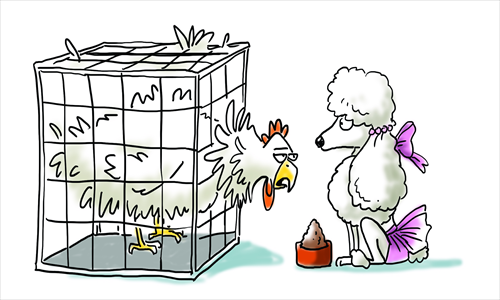HOME >> OP-ED
Animal rights rely on human concepts
By Rong Xiaoqing Source:Global Times Published: 2013-12-5 19:28:01

Illustration: Liu Rui/GT
I have never worn fur. And I have never tried to eat anything live, be it oysters, live boiling fish, or the more brutal Cantonese dish involving live monkeys and their brains. I don't support killing animals unless there is a good reason. I don't support unnecessary cruelty.
But I do eat meat, wear leather shoes and kill mosquitoes or cockroaches whenever I see them in my apartment. I also once dissected a frog in my middle school biology class - though that was under my teacher's orders.
So you know I am neither a coldblooded animal abuser nor a guardian angel for animals. Sometimes I wonder whether there is another sane way to interact with animals, rather than just treating them as lesser creatures. But this may have put me at odds with the modern relationship between humans and animals, which seems to be about dragging animals into the world of people.
In terms of animal rights, it is we humans who decide which animals should be protected and which ones should sacrifice their lives for our stomach, based on our own tastes.
We decide it's okay to slaughter animals for bacon or beef as long as we kill them quickly. We decide hunting isn't immoral as long as we do it in the wild so animals have the opportunity to run away.
It may sound a little strange that the species at the top of the biological pyramid get the sole right to decide on the rules of a concept based on equality. But I appreciate this hypocrisy - if the rules had been written by tigers, we would probably all have been eaten by now.
Shedding light on all this is a recent investigative story in the Hollywood Reporter about how an animal protection organization overlooked possible animal cruelty in Hollywood movie productions.
The organization, the American Humane Association (AHA), sends inspectors to the production sites of movie and TV shows that involve animal actors, and grants them the "no animals were harmed" credit they can put on the screen to avoid protests from animal rights groups.
The investigation found that the inspectors ignored many questionable findings, including a "near drowned" tiger in Ang Lee's Life of Pi, a chipmunk getting squashed in Failure to Launch, and dozens of fish and squid washing up on shore during the filming of Pirates of the Caribbean. It also found that the organization is funded by two Hollywood industry entities.
The AHA said the story was exaggerated but it didn't point out any factual errors.
I am not bothered much by the under-reporting of these accidents. Human actors also get injured sometimes when shooting movies. Many don't draw attention unless the incident involves a movie star.
Of course, you may say humans do the work voluntarily whereas animals are forced to. But the concept of voluntary work is a dubious one - if we didn't have to work to put food on the table, many of us might not work.
What's more disturbing is to see the manipulation involved in all this. People want to see animals in movies; people don't want to see them treated cruelly. So what do we do? We get a group to claim that the animals are treated humanely even if they are not. It is all sickeningly neat.
When the idea of animal rights travels from the West to China, confusion reigns. While China has passed a law prohibiting the eating of dogs and cats, a related billboard advertisement in a subway station in the southwestern city of Chengdu caused controversy in the fall.
The ad featured a picture of a dog crouching in front of a gate and the line: "Do you want to eat a loyal security guard?" It was withdrawn when many people pointed out that to see dogs as security guards is insulting to the latter.
In a country where the word "dog" has been used in so many negative phrases, which emphasize the inferiority of dogs to humans, merely keeping dog meat off the menu may not be enough.
We may need another law to get rid of those words from our dictionary. Verbal abuse is also abuse, especially to some delicate and vulnerable hearts - human or animal.
The author is a New York-based journalist. rong_xiaoqing@hotmail.com
Posted in: Columnists, Viewpoint, Rong Xiaoqing